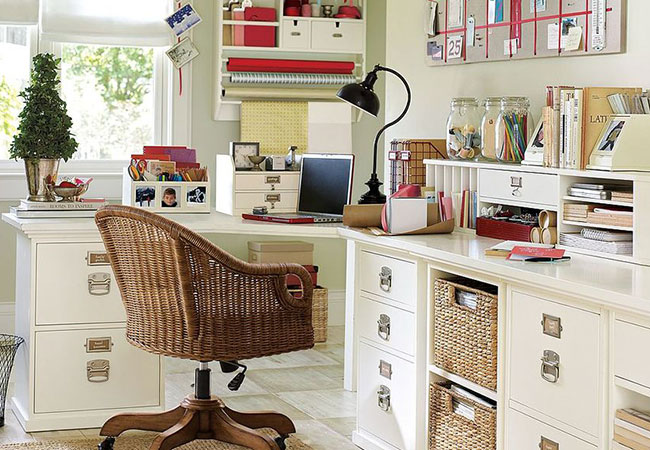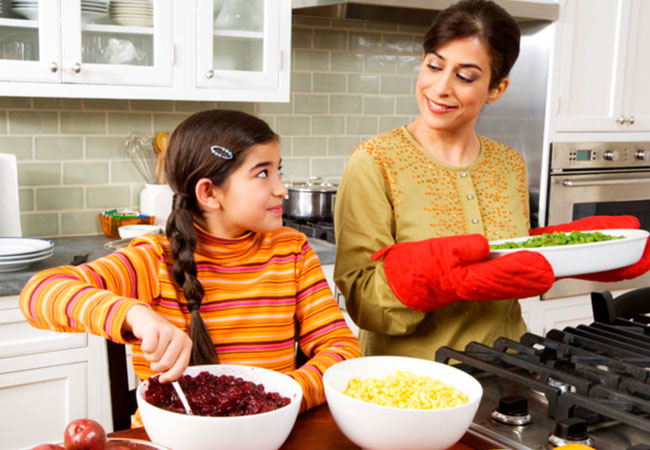
1) 3 steps to success
Introduce the ‘3 steps to success’ to your child as early as possible: 1) assemble supplies, 2) stay focused, 3) get it done. These 3 steps can be used for all tasks – from brushing teeth, to completing a big assignment and can really help a kid to start understanding organisation and using it routinely.Example - Let’s say your child has to study for a test.
a) Assemble supplies – get the subject textbook and notebook, reference books, pen, highlighting marker, rough book, water, and any other material required. Sit on the study table.
b) Stay focused – there might be an important match coming on tv, or the urge to text friends. The child has to learn to avoid all temptations and stay focused on the task at hand i.e. study for the test. A few ways you can help your child stay focused are: let them play, walk, cycle or do chores before sitting to study; keep them away from distractions such as cellphones and TV; make a to-do list; play ‘beat the clock’ with them; and let them take breaks in between schedules.
c) Get it done – this means revising, checking and putting finishing touches on the notes, and putting the supplies back in its right place.
Once children know these 3 steps by heart, they get more independent and can finish work more efficiently and consistently. They also rejoice every time they realize they have free time on their hands to do what they please!
2) Introduce checklists
Help your child get into the habit of using checklists and to-do lists to jot down important things such as homework, household chores, things to carry to class the next day, what to carry on vacation, etc. This helps ensure they complete everything on that list and don’t miss anything out. They also get a sense of accomplishment when they finish tasks on time which helps them enhance their self-confidence. Children can use mobile apps, a small notepad, post its or a dry-erase board to make checklists.
3) Use a calendar
Keep a large, wall-sized, master calendar for listing everyone’s schedules, meetings, commitments, appointments, major events, etc. This way, everyone can keep track of each other’s activities and avoid scheduling conflicts. Encourage your child to use the calendar to stay on top of his or her timelines too. You can also spend Sunday afternoons checking schedules and updating the calendar. Alternatively, you can teach your child to keep a personal planner / wall calendar / electronic calendar to make deadlines more visible, cross off dates until a big event, jot down household chores, set reminders, etc.4) Establish household routines
Creating a regular routine for dinner-time, bed-time, play-time, TV-time, etc. will help your child fall into a fixed pattern and wake up refreshed every day. Setting aside certain days to do certain chores also enables them to understand what to expect.5) Teach them how to use their “Free Time”
There are times when children have a lot of free time on their hands, like when they are on vacation. How to manage free time is crucial to developing effective time management techniques that will help them later in life, particularly in college when they have to attend barely 10 – 15 hours a week. Time management consists of doing 3 things – planning, prioritizing and estimating the time required.Help your child to create and follow a schedule for studying, playing, doing chores, working on a hobby or a sport, and learning something new. After a week, review the results. Did they over or under estimate the time required? Did they feel like they needed more time for an activity? After a few revisions, your child will have an optimum schedule for using his or her free time and a better idea on how manage time well. This is one of the best tips on How To Help Your Child Get More Organised.
6) Use containers and organizers
Use containers and organisers to keep items of similar nature together. This way, the child knows where to look for something and also learns to return an item back into its container in order to avoid misplacing it.7) Organize schoolwork
Help your child keep track of papers, assignments, notes, and homework using binders and folders. It also helps to colour-code the subjects for easy access. This ensures that all things are kept in one place and also makes it easier to review them later while preparing for tests and quizzes. You can also create ‘to do’ and ‘done’ folders for all the different assignments and a separate folder for circulars and papers to be signed by parents.8) Create an organized workspace
Set aside a place at home where you child can sit and study without interruption. Make sure that there is stationery, a calculator and a tablet or laptop in that designated workspace. It also helps if the workspace is close to you, in case your child needs your help and support. You can also hang a bulletin or a white board, colorful flashcards and inspirational posters there.9) Designate a study time
Sit with your child and decide on a certain time when he or she should be studying or doing homework every day. This should ideally be after the child has had time to relax after coming from school. If there is no homework, upcoming exam or project to work on, make your child do something productive like read for pleasure or solve a crossword puzzle at that time.10) Help Set Timelines
When your child is assigned a major project or assignment that is due months later, it helps to assign a strict timeline. To do this, first mark the due date on the calendar. Then set specific dates between now and the due date by which certain tasks have to be completed such as – research and gather all information, collect all materials, create the rough draft (and show to the teacher if required), start work, half way point, finishing touches, check and submit. This helps in breaking a huge, daunting task into small, manageable chunks that is more easily achievable. It shows the child that every task has a beginning, a middle and an end. Use this strategy for chores also – for example, in order to pack for a 3-week vacation, pack only the t-shirts on one day, jeans on one day, innerwear and swimwear on one day, and so on. This is one of the best tips on How To Help Your Child Get More Organised.11) Conduct weekly cleanups
Encourage your child to clean and sort through notebooks and bags on a weekly basis. Papers and assignments found in the bags or books must go in the right folders at home. Cleaning and organizing the bedroom every fortnight or month also ensures that everything is always kept in its place.
12)Assign Chores that Involve sorting
Cleaning the cupboard, grocery shopping, sorting photos, filing papers, etc. are great choices that involve pre-planning, making lists, strategizing and arranging things optimally. Performing small tasks such as these in the house develops a habit for organization in children.13) Get into a bedtime routine
Before bed, review plans and prepare for the next day. This means packing the bag, laying down the clothes, socks, shoes, and accessories, keeping whatever needs to be carried handy, etc. It also helps to discuss the next day’s schedule and what steps the child should take if the schedule is disrupted due to some reason. Being prepared for the oncoming day helps children feel more secure and ensure that they don’t forget anything.14) Cook together
Cooking is an art that involves measuring, following directions, sorting ingredients, and managing time – all key elements to teach organization. Involving children in meal planning is also helpful as they can help put together a shopping list.
15) Other tips
Other tips on how to get your child more organized are: cultivating an interest in collecting items such as stamps or buttons; introducing idea organizers that help in making quick notes or ideas in a graphical way; creating fun memory aids to remember information; and keeping children in charge of adult functions such as filling forms, making appointments, talking to authoritative figures, etc. This builds in positive mentality too.It’s very important to introduce organizational habits as soon as possible to children so that it becomes second nature to them as they grow up. And remember, organizing can be a challenge for children, so reward and support them in the process by developing different routines and giving treats when they accomplish a job well! We hope you liked our guide on How To Help Your Child Get More Organised.









